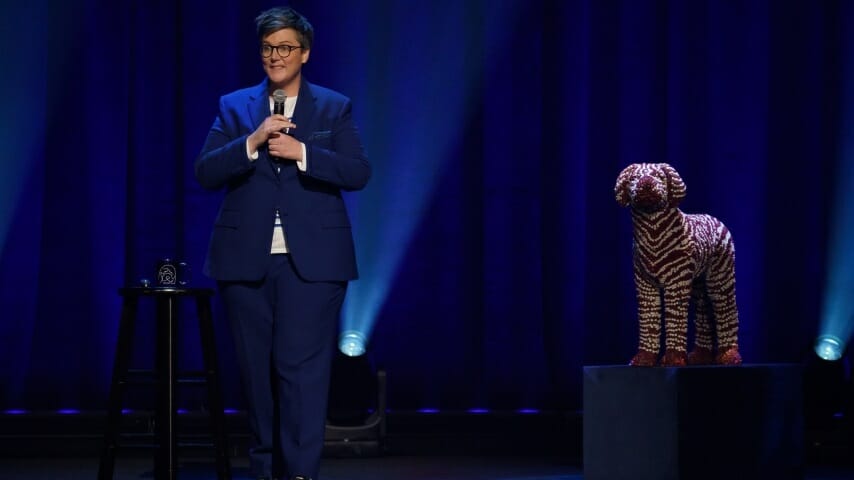Hannah Gadsby’s Sophomore Comedy Special Is No Nanette
Photo by Ali Goldstein, courtesy of Netflix Comedy Reviews Hannah Gadsby
Note: This review was originally published on May 28, 2020. We are republishing it ahead of Hannah Gadsby’s new hour, Something Special, which will be released on Netflix on May 9, 2023.
Before I watched Douglas, Hannah Gadsby’s second Netflix special, I was determined to avoid mentioning Nanette as much as possible in my review. This new hour, which Gadsby snarkily refers to as their difficult sophomore album while pointing out that it’s their tenth show overall, deserves to be considered on its own merits. Of course I knew at some point I’d have to bring up Gadsby’s first Netflix special, which many (including Paste) thought was the best comedy special of 2018, and which everybody has to agree was the most controversial. It’s the main reason they’re known in America, as they point out repeatedly in Douglas, and became a flashpoint in the ongoing dispute over what forms comedy can take. But the goal wasn’t to constantly call back to Nanette, but mention it solely as a reference point.
Well, it turns out it’s impossible to talk about Douglas without framing it almost entirely in relation to Nanette. That’s because Gadsby themselves does it. Their new special is constantly in conversation not with Nanette, but with the reaction to it and debate that grew around it, particularly the exhausting, idiotic ire of those who insisted it didn’t count as comedy. Although this is a different show in tone, content and context, one that’s intentionally more comic than the last, it couldn’t exist without Nanette, and needs to be watched in conjunction with it.
Gadsby starts with a clever but too-long opening bit where they want to set expectations for an American audience that only knows them for Nanette. They runs through a detailed outline of the show that follows to make sure that everybody is reasonably on the same page as them. It is exhausting in its own way—not depressingly, all-encompassingly so as the Nanette debate was, of course, but what starts off as a fun, cheeky joke drags on for too long. It’s also the first hint that the Gadsby we see in Douglas will fall prey to something that they were admirably able to avoid in Nanette; like some of the material that follows, this intro feels a little too self-impressed.
Douglas is a funnier show than Nanette. That’s on purpose. It has more jokes, many of which are very good. There’s an extended section at the end where Gadsby speeds through a slideshow of Renaissance art while dropping one hilarious observation after another, often framed around how male artists depicted women and their lives, and thus how the patriarchy has tried to control women for almost all of history. This is a fast-paced, but very controlled bit of business, and proof of how Gadsby is an accomplished master of performance; it has the speed and flow of ‘80s Robin Williams stand-up without the mania or desperation. It’s really good comedy.
Elsewhere, though, Douglas can feel a little pandering. Nanette defused any complaints about “clapter”—the notion that some comedians angle for applause through reaffirming political beliefs rather than actually trying to get laughs—because of how personal, inspired, and inflamed Gadsby was. It was a sustained critique of society that operated simultaneously in the macro and the micro, and although it was a well-honed performance, it was still powerfully candid and honest. Douglas has a few moments that come off as not disingenuous, per se, but more calculated—one-off observations that sound like slogans and seem only there to impress the audience. It doesn’t happen too often, but when it does it lands with a thud.
These two sides of Douglas travel hand in hand. When Gadsby talks about their relatively recent autism diagnosis, they do so with a muted version of the charm, frustration and anger that they showed in Nanette. When it becomes a well-intentioned tirade against the anti-vaccine movement, it initially feels sharp and vital, but occasionally dips into the self-impressed reaffirmation of their audience’s political views. This tends to happen throughout Douglas; Gadsby will be on a spirited soliloquy about a topic, and then will hit on a line or two that rings false—a statement that seems less interested in laughs or supporting their point than in getting approval from the audience. These moments undermine what’s good and important about Douglas.
That doesn’t completely derail the special. Gadsby is about as confident a performer as you’ll ever see, and has the audience in their thrall well before the first of those clapter lines. Their criticisms of America are biting and pithy, especially what they say about how making fun of this country is still punching up. Their responses to the men who criticized Nanette, and to how men have set the so-called “rules” of comedy the same way they’ve built most of society’s rules, often have the same sting seen on their last special. As Gadsby themselves explains over the first 15 or so minutes of Douglas, though, don’t expect a rehash of their American breakthrough. Expect something that’s funnier than Nanette, still passionate but not quite as much so, and that lies undeniably in its shadow.
Senior editor Garrett Martin writes about videogames, comedy, travel, theme parks, wrestling, and anything else that gets in his way. He’s on Twitter @grmartin.